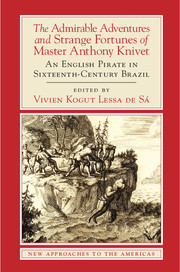 The Admirable Adventures and Strange Fortunes of Master Anthony Knivet
The Admirable Adventures and Strange Fortunes of Master Anthony Knivet Published online by Cambridge University Press: 05 September 2015
Anthony Knyvett
In the third part of the “Admirable Adventures,” we find our adventurer, Anthony Knivet, enjoying a rare moment of stability and quiet while living among the Tamoio in the forestland of the Mantiqueira hills, deep in the sertão of São Paulo. “One day,” he tells us, “going all alone a fishing for pleasures sake, I sat downe remembring my selfe in what state I was, and thinking what I had beene” (AA, 93). This apparently innocent remark cannot but draw our attention. After all, it gives us a rare glimpse of Knivet's emotional state in a narrative mostly concerned with events and experiences rather than with inner states of being. More important, it points to an enigmatic element: the complete opacity of Anthony Knivet's biographical self. What had he been before he set out on Cavendish's voyage? And what became of him after his return?
In the “Admirable Adventures” neither Knivet nor Purchas give us any clue about the author's real identity. This omission led most commentators to wrongly qualify Knivet as a “poore ship boy,” a self-definition he gives Salvador Correia de Sá at the outset in order to mask his real social status. This is why his companion, Henry Barrawell, reproaches him, “asking what I meant to say so to the Governour” (AA, 65), the reason possibly being that Knivet's fate among the Portuguese risked being even worse had the governor known of his kinship with influential members of the Elizabethan court.
Brazilian scholar Carvalho Franco was the first to hint at Anthony Knivet's true identity in his notes to the Brazilian translation of 1947. He remarks that, in the incident mentioned earlier, Knivet was deliberately concealing a background of “a much higher social level than the one mentioned,” something corroborated by a marginal note in Pilgrimage that reads “Ant. Knivet, kinsman to the Lord Knivet,” the only information Purchas ever gives us about Knivet's identity. Thomas, Lord Knyvett, was a prominent name in Elizabeth's and later in James's court. Although Franco cannot identify Anthony Knivet's exact kinship to Lord Knyvett (who died childless), he mentions the latter's brother, Sir Henry Knyvett of Charlton.
To save this book to your Kindle, first ensure no-reply@cambridge.org is added to your Approved Personal Document E-mail List under your Personal Document Settings on the Manage Your Content and Devices page of your Amazon account. Then enter the ‘name’ part of your Kindle email address below. Find out more about saving to your Kindle.
Note you can select to save to either the @free.kindle.com or @kindle.com variations. ‘@free.kindle.com’ emails are free but can only be saved to your device when it is connected to wi-fi. ‘@kindle.com’ emails can be delivered even when you are not connected to wi-fi, but note that service fees apply.
Find out more about the Kindle Personal Document Service.
To save content items to your account, please confirm that you agree to abide by our usage policies. If this is the first time you use this feature, you will be asked to authorise Cambridge Core to connect with your account. Find out more about saving content to Dropbox.
To save content items to your account, please confirm that you agree to abide by our usage policies. If this is the first time you use this feature, you will be asked to authorise Cambridge Core to connect with your account. Find out more about saving content to Google Drive.